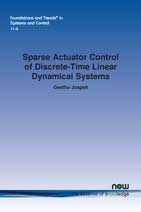Sparse Actuator Control of Discrete-Time Linear Dynamical Systems
By Geethu Joseph, Delft University of Technology, The Netherlands, g.joseph@tudelft.nl
Abstract
This monograph presents some exciting and new results on the analysis and design of control of discrete-time linear dynamical systems using sparse actuator control. Sparsity constraints arise naturally in the inputs of several linear systems due to limited resources or the underlying physics. The monograph deals with two types of sparsity constraints: time-varying and time-invariant supported sparse control inputs. It first provides a detailed theoretical discussion on controllability under sparsity constraints, including algebraic necessary and sufficient conditions for ensuring controllability. Several related formulations, covering stabilizability, output controllability, and nonnegative controllability under sparsity constraints, are also presented. Further, for sparsely controllable systems, the monograph describes two efficient, systematic, and rigorous approaches to designing sparse control inputs: compressed sensing algorithms and spare actuator scheduling algorithms. Overall, the concepts covered in the monograph provide various sparsity models, algorithms, and analysis tools that are readily accessible to systems and control, signal processing, and applied mathematics readers.
Sparse Actuator Control of Discrete-Time Linear Dynamical Systems
This monograph presents new results on the analysis and design of control of discrete-time linear dynamical systems using sparse actuator control. Sparsity constraints on control inputs arise naturally in the inputs of several linear systems due to limited resources such as computational power, energy, and communication bandwidth, or the underlying physics. The monograph deals with two types of sparsity constraints: time-varying and time-invariant supported sparse control inputs. It first provides a detailed theoretical discussion on controllability under sparsity constraints, including algebraic necessary and sufficient conditions for ensuring controllability. Several related formulations, covering stabilizability, output controllability, and nonnegative controllability under sparsity constraints, are also presented.
Further, for sparsely controllable systems, the monograph describes two efficient, systematic, and rigorous approaches to designing sparse control inputs: compressed sensing algorithms and spare actuator scheduling algorithms. Overall, the concepts covered in the monograph provide various sparsity models, algorithms, and analysis tools that are readily accessible to systems and control, signal processing, and applied mathematics readers.
